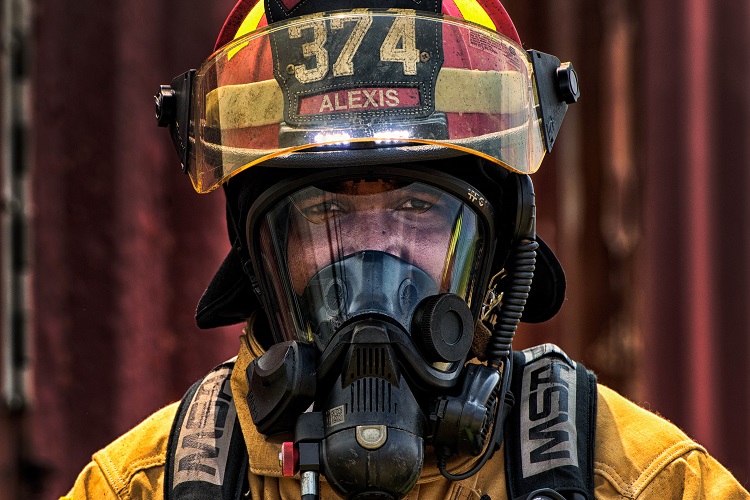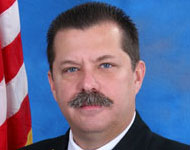

Staff Sgt. Trevor Alexis, a 374th Civil Engineer Squadron fire protection NCO in charge of training, waits to enter a flashover trainer on August 4, 2015, at Yokota Air Base, Japan. (Photo by U.S. Air Force Airman 1st Class Delano Scott.)
By Dennis L. Rubin
In General Colin Powell’s autobiography, My American Journey, Powell points out the fact that “Someone is always watching.” If you enjoy learning about leadership, do yourself a huge favor and get a copy of this book. Keep it close at hand and review its lessons often.
Among the topics discussed, Powell writes about always being under the watchful eye of many people. In most cases, the “watchers” were not trying to ensure that Powell was doing well and becoming successful, but to catch him in the act of performing poorly or, worse yet, doing something wrong. By virtue of General Powell’s legacy—all of the tremendous successes and great accomplishments—the naysayers watched closely, but very few mistakes were observed.
Nonetheless, many people watched every aspect of Powell’s life so that they could get unfavorable information about him in an attempt to cast doubt onto this rising star, thereby eroding Powell’s credibility and limiting his career. Plain and simple, their hope in watching Powell closely was to undermine the military and political greatness of this amazing American hero. Of course, General Powell rose above the scrutiny and gave us all a very clear message: Do the right thing, even when no one is watching! Because, as Powell notes, if a person does the right thing when no one is watching, they assuredly will do the right thing when others are watching. Always be mindful that “Someone is always watching.”
To underline the General’s sage advice and warning, a few years ago I was flying across the country to go to the Alaska Fire Chiefs Conference. Because of the length of the flight, I was able to finish the book that I carried along and was looking for more reading material. In the seat back pocket, I found a folded-up Wall Street Journal Newspaper; that was just the ticket to keep me occupied me on the flight segment from Seattle to Anchorage. As I scoured the slightly used copy, I found an interesting story about the proliferation of security cameras in all of North America.
The news article pointed out that security cameras are placed everywhere; they are in areas such as grocery stores, ATM machines, hotels, throughout casinos and gas stations (just ask the three US 2016 Olympic swimmers about security cameras that are in Rio), just to name a few. On average, a person’s image will appear on a security camera about 22 times per day every day. The news piece pointed out that if someone is living in an urban area, he is captured more often than a rural counterpart based on the sheer number of commercial occupancies present in big cities. The light bulb flashed once again: “Someone is always watching.”
RELATED: Miller and Langlois on Functional Fireground Accountability ‖ Melfi on Fire Service Accountability ‖ Smith on Inspector Accountability
Recently, the Federal District Court system invited me to attend a court case as a defense “guest” (witness) in a wrongful termination case. At stake was a lot of city money; the plaintiff was suing for years’ worth of back pay, which was a large lump sum of cash (around seven figures). With so much on the line, the city’s defense attorney would update me from time to time about the details of the case. It seemed like the lawyer called me a dozen times to have conversations regarding trial preparation issues. Being a “named defendant,” I was scheduled to appear in the courtroom a few days after the federal civil case got underway.
As the testimony raged on, the city’s defense attorney pointed out, in a lengthy prep phone call, that the plaintiff’s legal team had two computers open and running, connected to the internet. The devices were sitting on the courtroom table; my personal Twitter page was on one of the devices and my personal Facebook page was open on the other device. The city’s council pointed out that for the 90-minute mid-day break, the plaintiff’s attorneys poured over my social media, looking at everything on both sites. The defense counsel wanted to know what trial-related posts I had broadcast out on both of my social media sites.
I was able to respond quickly—I hadn’t posted a single item or issue related to this trial. The city’s attorney was relieved and glad that I hadn’t sent out a single tweet or post relating to the case. I was glad to reduce the collateral fodder with which the plaintiff’s attorney tried work me over during my time in the witness box. In just a few short days, I was called into federal courtroom #15. Soon, it would be time to tell the eight jurors all that I knew about this case.
I asked the city’s attorney, “What would the opposing council do with any social media information relating to the case that I might have released.” I went on to say to him, “That is protected speech under the First Amendment, right?” The answer was that he didn’t know what the opposing counsel would do with any information that I may had posted, but that surely nothing good could have come from it anyway. Furthermore, it is as protected as any other speech, but it could certainly be part of the questioning or dialog of this or any other trial. The city’s attorney thanked me and asked if I would keep silent on all social media fronts until after the case was complete. Without hesitation, I agreed to his request and had no intention to add to the potential harm that could have occurred.
Once again, I heard the General’s voice reaching out to me from the pages of his book: “Someone is always watching.” Truer words have never been spoken. In today’s society, be careful of what you say, be careful of what you do, and be careful of what you write. In a recent Alan Brunacini leadership conference, the chief offered another of his many quotable quotes: “Public men and women live public lives. What they do and say will be watched, closely.” Think about that before you hit the “Send” or “Post” button.
(And by the way: Yes, we won the case. The former member is still fired!)
 Dennis L. Rubin is the principle partner in the fire protection-consulting firm D.L. Rubin & Associates. His experience in the fire and rescue service spans more than 38 years. He has served as a company officer, command level officer, or fire chief in several major cities, including Dothan, Alabama; Norfolk, Virginia; Atlanta, Georgia; and Washington, D.C. He served on several committees with the International Association of Fire Chiefs, including a two-year term as the Health and Safety Committee chair. He is a graduate of University of Maryland.
Dennis L. Rubin is the principle partner in the fire protection-consulting firm D.L. Rubin & Associates. His experience in the fire and rescue service spans more than 38 years. He has served as a company officer, command level officer, or fire chief in several major cities, including Dothan, Alabama; Norfolk, Virginia; Atlanta, Georgia; and Washington, D.C. He served on several committees with the International Association of Fire Chiefs, including a two-year term as the Health and Safety Committee chair. He is a graduate of University of Maryland.
MORE DENNIS RUBIN
- When Words Became Weapons, Part 3
- When Words Became Weapons, Part 2
-
When Words Became Weapons, Part 1
- Dealing With Seriously Bad Behaviors, Part I
- Dealing With Seriously Bad Behaviors, Part 2
- Dealing With Seriously Bad Behaviors, Part 3
- Dealing With Seriously Bad Behaviors, Part 4
- Managing the Information Flow at Large-Scale Emergency Incidents


